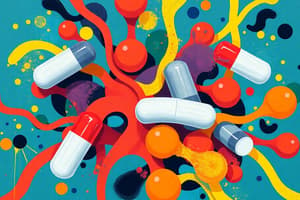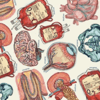Podcast
Questions and Answers
ما هو مكان جسم الخلية للخلية العصبية السابقة للعقد؟
ما هو مكان جسم الخلية للخلية العصبية السابقة للعقد؟
- في العضو المستهدف
- في الجهاز العصبي المركزي (correct)
- في الأعصاب الطرفية
- في العقد
أين توجد الشُعيرات العصبية المتصلة للخلية العصبية اللاحقة للعقد؟
أين توجد الشُعيرات العصبية المتصلة للخلية العصبية اللاحقة للعقد؟
- في الأنسجة العضلية
- في العقد
- في العضو المتأثر (correct)
- في الجهاز العصبي المركزي
ما هو الدور الرئيسي للنقل العصبي الأدرينالي؟
ما هو الدور الرئيسي للنقل العصبي الأدرينالي؟
- تنشيط العقد فقط
- التواصل بين العقد والعضو المستهدف (correct)
- تنظيم وظائف الجهاز العصبي المركزي
- التواصل بين الجهاز العصبي المركزي والعقد
ما هو المكان الذي يقع فيه جسم الخلية للخلية العصبية اللاحقة للعقد؟
ما هو المكان الذي يقع فيه جسم الخلية للخلية العصبية اللاحقة للعقد؟
ما هو الذي يميز الخلايا العصبية السابقة للعقد عن اللاحقة؟
ما هو الذي يميز الخلايا العصبية السابقة للعقد عن اللاحقة؟
ما هي المواد الكيميائية التي تعرف بالنواقل العصبية في نقل الإشارات الأدرينالية؟
ما هي المواد الكيميائية التي تعرف بالنواقل العصبية في نقل الإشارات الأدرينالية؟
ما الذي يتكون من مجموعة الكاتيكول ومجموعة الأنين؟
ما الذي يتكون من مجموعة الكاتيكول ومجموعة الأنين؟
أي من الخيارات التالية ليست نواقل عصبية مرتبط بنقل الإشارات الأدرينالية؟
أي من الخيارات التالية ليست نواقل عصبية مرتبط بنقل الإشارات الأدرينالية؟
ما هو التركيب الكيميائي للكاتيكولامينات؟
ما هو التركيب الكيميائي للكاتيكولامينات؟
ما الغرض الأساسي للكاتيكولامينات في الجسد؟
ما الغرض الأساسي للكاتيكولامينات في الجسد؟
ما هي المشكلة التي تشير إليها تكرار التبول غير الطبيعي؟
ما هي المشكلة التي تشير إليها تكرار التبول غير الطبيعي؟
ما هي الأدوية المستخدمة لعلاج تكرار التبول؟
ما هي الأدوية المستخدمة لعلاج تكرار التبول؟
كيف تؤثر الأدوية المستخدمة على العضلات في المثانة؟
كيف تؤثر الأدوية المستخدمة على العضلات في المثانة؟
ما هو دور العضلات المحيطة بالمثانة عند استخدام الأدوية؟
ما هو دور العضلات المحيطة بالمثانة عند استخدام الأدوية؟
ما هي العضلات التي تتأثر بشكل مباشر بعلاج تكرار التبول؟
ما هي العضلات التي تتأثر بشكل مباشر بعلاج تكرار التبول؟
ما هو التأثير الذي يسببه زيادة معدل ضربات القلب على ضغط الدم؟
ما هو التأثير الذي يسببه زيادة معدل ضربات القلب على ضغط الدم؟
ما هو دور المقاومة في تنظيم ضغط الدم؟
ما هو دور المقاومة في تنظيم ضغط الدم؟
أي من العوامل التالية قد تساهم في زيادة معدل ضربات القلب؟
أي من العوامل التالية قد تساهم في زيادة معدل ضربات القلب؟
كيف يمكن أن تؤثر زيادة الضغط الانقباضي على القدرة البدنية؟
كيف يمكن أن تؤثر زيادة الضغط الانقباضي على القدرة البدنية؟
ما هو التأثير المباشر لزيادة ضغط الدم؟
ما هو التأثير المباشر لزيادة ضغط الدم؟
ما هي الاستجابة التي تنشأ عندما يتعرض القلب لضغط عالٍ؟
ما هي الاستجابة التي تنشأ عندما يتعرض القلب لضغط عالٍ؟
ما هو الغرض من استجابة بطء القلب في حالة الضغط العالي؟
ما هو الغرض من استجابة بطء القلب في حالة الضغط العالي؟
ما الذي يحدث للقلب عندما يتعرض لضغط عالي؟
ما الذي يحدث للقلب عندما يتعرض لضغط عالي؟
كيف يؤثر الضغط العالي على معدل ضربات القلب؟
كيف يؤثر الضغط العالي على معدل ضربات القلب؟
ما هو الانعكاس الذي يحدث عندما يتباطأ قلب الشخص بسبب الضغط العالي؟
ما هو الانعكاس الذي يحدث عندما يتباطأ قلب الشخص بسبب الضغط العالي؟
ما هي المستقبلات التي تلعب دورًا متعارضًا في إفراز الرينين؟
ما هي المستقبلات التي تلعب دورًا متعارضًا في إفراز الرينين؟
أي من التأثيرات التالية يرتبط بتفاعل نظام الاستجابة الودية؟
أي من التأثيرات التالية يرتبط بتفاعل نظام الاستجابة الودية؟
ما العلاقة بين مستقبلات بيتا 1 ومؤثرات ألفا 2؟
ما العلاقة بين مستقبلات بيتا 1 ومؤثرات ألفا 2؟
أي من العبارات التالية صحيحة بشأن المستقبلات الأدرينية؟
أي من العبارات التالية صحيحة بشأن المستقبلات الأدرينية؟
كيف يعمل مستقبل بيتا 1 في تفاعل الجهاز العصبي؟
كيف يعمل مستقبل بيتا 1 في تفاعل الجهاز العصبي؟
Flashcards
النواقل العصبية في الإرسال الأدريناليني
النواقل العصبية في الإرسال الأدريناليني
هي مواد تسمى الكاتيكولامينات، تتكون من مجموعة كاتيكول ومجموعة أمين.
الكاتيكولامينات
الكاتيكولامينات
نوع من النواقل العصبية في الإرسال الأدريناليني.
المجموعة الكاتيكول
المجموعة الكاتيكول
جزء من تركيب الكاتيكولامينات.
المجموعة الأمين
المجموعة الأمين
Signup and view all the flashcards
الإرسال الأدريناليني
الإرسال الأدريناليني
Signup and view all the flashcards
الخلايا العصبية قبل العقدية
الخلايا العصبية قبل العقدية
Signup and view all the flashcards
الخلايا العصبية بعد العقدية
الخلايا العصبية بعد العقدية
Signup and view all the flashcards
النقل العصبي الأدريناليني
النقل العصبي الأدريناليني
Signup and view all the flashcards
العقد العصبية
العقد العصبية
Signup and view all the flashcards
الأعضاء المستهدفة
الأعضاء المستهدفة
Signup and view all the flashcards
تواتر التبول
تواتر التبول
Signup and view all the flashcards
عضلة المثانة
عضلة المثانة
Signup and view all the flashcards
منع التسرب
منع التسرب
Signup and view all the flashcards
مضادات مستقبلات β
مضادات مستقبلات β
Signup and view all the flashcards
منشطات مستقبلات α
منشطات مستقبلات α
Signup and view all the flashcards
المستقبلات المتضادة
المستقبلات المتضادة
Signup and view all the flashcards
β₁
β₁
Signup and view all the flashcards
الربط بين β₁ و α₂
الربط بين β₁ و α₂
Signup and view all the flashcards
التفاعل الودي
التفاعل الودي
Signup and view all the flashcards
الاستجابة الودية
الاستجابة الودية
Signup and view all the flashcards
المقاومة
المقاومة
Signup and view all the flashcards
B1j
B1j
Signup and view all the flashcards
التنشيط
التنشيط
Signup and view all the flashcards
معدل ضربات القلب
معدل ضربات القلب
Signup and view all the flashcards
ضغط الدم الانقباضي وضغط الدم الانبساطي
ضغط الدم الانقباضي وضغط الدم الانبساطي
Signup and view all the flashcards
انخفاض معدل ضربات القلب
انخفاض معدل ضربات القلب
Signup and view all the flashcards
انعكاس بُطء القلب
انعكاس بُطء القلب
Signup and view all the flashcards
ضغط الدم المرتفع
ضغط الدم المرتفع
Signup and view all the flashcards
وظيفة انعكاس بُطء القلب
وظيفة انعكاس بُطء القلب
Signup and view all the flashcards
Study Notes
Pharmacology 1, Lecture 7: Adrenoceptor Agonists & Sympathomimetic Drugs
- Adrenergic neurons release norepinephrine as their primary neurotransmitter.
- These neurons are present in the central nervous system (CNS) and the sympathetic nervous system, acting as connections between ganglia and effector organs.
- Adrenergic neurons and receptors (presynaptic on neurons, postsynaptic on effector organs) are the target sites for adrenergic drugs.
- Neurotransmission in the sympathetic pathway uses chemical neurotransmitters stimulating adrenergic neurons.
- Receptors for these neurotransmitters are present on the effector organs.
Overview of Adrenergic Neurotransmission
- Catecholamines are the primary neurotransmitters in adrenergic transmission.
- These include norepinephrine (noradrenaline), epinephrine (adrenaline), isoproterenol, dopamine, and others.
- Norepinephrine is the dominant neurotransmitter released in response to nerve impulses reaching adrenergic neurons.
- Enzymes (MAO and COMT) break down norepinephrine, after which it’s stored in vessels for reuse.
Adrenergic Receptors
- All adrenergic receptors are G-protein coupled receptors (GPCRs), specifically 7-transmembrane G-protein coupled receptors.
- Two major classes of adrenergic receptors exist: α and β receptors, each with subtypes (α₁ and α₂, β₁ and β₂, β₃).
- Alpha and beta receptors are binding sites for adrenergic neurotransmitters (catecholamines).
- These receptors can have either stimulatory or inhibitory actions on effector organs, depending on the subtype of receptor.
- Different catecholamines have different affinities for different receptor subtypes. For example, epinephrine has higher affinity for α receptors, whilst Isoproterenol has highest affinity to B receptors.
Alpha Receptors
- Subdivided into α₁ and α₂.
- α₁ receptors (GPCR-Gq) are located postsynaptically, causing smooth muscle contraction.
- α₂ receptors (GPCR-Gi) are primarily presynaptic, functioning as autoreceptors. Found on other cells like pancreatic cells.
- Epinephrine has highest affinity to alpha receptors.
Beta Receptors
- Subdivided into β₁, β₂, and β₃.
- β₁ receptors (GPCR-Gs) have similar affinities for epinephrine and norepinephrine, influencing heart rate and force of contraction (increased cardiac output). Found primarily in the heart and kidneys.
- β₂ receptors (GPCR-Gs) have higher affinity for epinephrine, causing bronchodilation, relaxation of vascular smooth muscle, and skeletal muscle.
- β₃ receptors (GPCR-Gs) mediate lipolysis in fat cells, among other effects.
Distribution of Receptor Subtypes
- Different tissues express different combinations of receptor subtypes.
- Tissue distribution influences the responses of different organs to adrenergic stimulation.
Sympathomimetic Drugs
- Direct acting sympathomimetics directly affect adrenergic receptors (selective or non-selective).
- Indirect acting sympathomimetics influence noradrenaline or adrenaline release to stimulate receptors.
- Mixed acting sympathomimetics release adrenaline and affect receptors directly.
Organ System Effects of Sympathomimetics
- Effects on Cardiovascular System: The system response to sympathomimetics depends on receptor density and distribution within each organ.
- Effects on Respiratory System: Bronchodilation is a key effect
- Effects on Eyes: Increased pupil dilation
- Effects on Genitourinary System: Urinary retention might be observed.
- Effects on Other systems: Influences on the Gastrointestinal tract, Metabolism, and Hormones secretion are also observed.
Norepinephrine and Epinephrine effects
- Norepinephrine:
- Increases peripheral resistance.
- Increases both diastolic and systolic blood pressure.
- Compensatory baroreflex activation occurs to manage these effects, leading to bradycardia.
- Epinephrine:
- Marked effects on the cardiovascular system; it's a powerful cardiac stimulant.
- Increases cardiac output and oxygen demand.
- Decreases total peripheral resistance and increases systolic blood pressure.
- Isoproterenol:
- Intense stimulation of the heart, increasing cardiac output leading to a fall in diastolic and mean arterial pressure.
- Marked relaxation of vascular beds in skeletal muscle.
Studying That Suits You
Use AI to generate personalized quizzes and flashcards to suit your learning preferences.
Related Documents
Description
تتناول هذه المحاضرة دراسة الأدوية المحاكية للأدرينالين وتأثيرها على مستقبلات الأدرينالين. سيتم استعراض الآليات التي تعمل بها النواقل العصبية الأدرينية وتأثيرها على الأعصاب والعضلات. استعد لاختبار معلوماتك حول الأدوية المستخدمة في هذا السياق.





